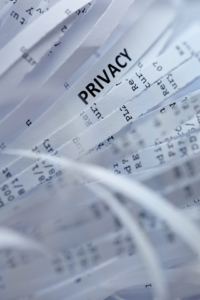According to a recent report from Pew Research, many Americans take privacy seriously—as in the cyber kind, but also offline.

- 9% of survey respondents thought they had strong control over how much of their personal information was collected and shared.
- 38% thought they had moderate control; 37% believed they had little control; 13% said they had zero control.
- 25% used temporary e-mail addresses or usernames for some online activities.
- 24% gave non-truthful information about themselves (e.g., when registering on a site to post comments, a single woman might indicate that she’s a married man; or a childless person might indicate that he has kids).
- 59% cleared their browser and cookies.
- 47% avoided giving out non-relevant information for online transactions.
- 55% remained anonymous for some online activities.
- 74% believe the government should have better limits to collecting people’s data.
Why don’t more people do things in the name of privacy like adjust the settings of their accounts or smartphone? For starters, some don’t want to hassle with “techy” things, while others don’t think it’ll make any difference. Some just aren’t worried all that much and have nothing to hide. Others don’t want to pay more money for more security. And some are clueless over how much of their data gets shared, such as those who blindly allow mobile apps “permissions.”
Some users also know that higher privacy, in general, comes with slower loading times and other inconveniences. People want efficient usability. Nevertheless, people are getting cranky.
For example, the U.S. Drug Enforcement Administration was surveilling Americans’ phone calls overseas. They’ve now been sued. Secondly, the Stop Online Piracy Act was on the brink of being shelved, but lawmakers put a stop to these plans.
The National Security Agency’s metadata program with bulk phone calls was recently deemed illegal after the American Civil Liberties Union brought a lawsuit to the U.S. federal appeals court.
And that’s just a sample. There are more lawsuits in the works in the name of Americans’ privacy rights.
Robert Siciliano is an identity theft expert to BestIDTheftCompanys.com discussing identity theft prevention. Disclosures.
Comments